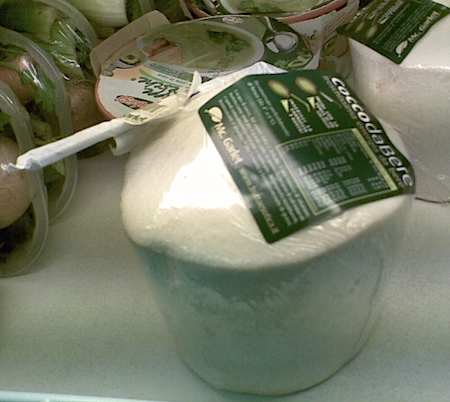We’ve been contacted by Dr Ana Valenzuela, an expert on agaves and tequila who has a website dedicated to the diffusion of information on sustainable agave agriculture, and to the conservation of diversity in this crop. We’re happy to add “Agaves Tequileros” to our blogroll. If you read Spanish, check out Ana’s blog.
Honeybees no longer pampered on the Pampas
Ranching in South America tends to get a bad press because it is often associated with Amazonian deforestation, but of course there are vast swathes of the continent where it makes good environmental sense, as well as economic. ((For a discussion of the related question of the bad press that pastoralism gets, see this post in CABI’s blog, which coincidentally came out just a few hours after I posted this.)) The Pampas grasslands of Argentina are a case in point. The home of gaucho culture ((Which, incidentally, is not as homogeneous and predictable as one might think.)), the Pampas are undergoing drastic change. The soybean boom is not just having an effect on the livestock industry, but also, perhaps surprisingly, on honeymaking. Much smaller in value, no doubt, than either soybeans or livestock, but these are not times to pass up on diversification.
Nibbles: Seed hunter, Milk, Wine, Pollinators, Cacao, Berries
- Seed hunter hunts cash. Australians can watch on 21 October.
- Is selling milk retail really diversification? Alex thinks so.
- In vino variety. Jeremy sez: “Theft (of headline) is flattery”.
- Pollinator presence plummets. Luigi also sez: “Theft (of headline) is flattery”.
- Cacao Germplasm Evaluation and Characterization Project. Nuff said.
- Ribes redux.
Drink this
I apologise for the quality of this image, but there I was in the local supermarket with only a phone. It shows a shrink-wrapped, cut and trimmed drinking coconut, complete with a straw and instructions for how to make a hole and insert the straw. I was astounded. So astounded that I didn’t register any of the details, like how much these go for, where they are coming from or whether anyone was buying them. If there are any left next time I’ll try to find out. Or maybe this is old news to someone, either in coconut-growing or coconut-drinking country.
Mash-up
 There’s an article in the latest Science entitled Celebrating Spuds. Unfortunately it is behind a paywall, so you may not be able to join in the celebrations. But even if you were, I’d suggest settling down with John Reader’s new book Propitious Esculent instead. I fancy myself moderately well informed about the potato but Reader served me with plenty of interesting new tidbits in addition to the usual fare. He has a terrific knack for putting things in context and for managing to take you off on detours so interesting that you hardly notice that you’ve deviated from the straightforward path. The silver mines of South America, for example, may well have been fuelled by potatoes, but the entire social set-up goes well beyond the potato as fuel and illuminates much of the Spanish conquest. Likewise, his very personal reminiscences of life in Ireland in the 1960s help to bring the great famine into perspective. His discussions of various food price crises in history is especially interesting today. When English farmers decided to abandon crops and instead grow sheep for wool, riding a boom in prices, there were riots in the streets over high prices for bread. Sound familiar?
There’s an article in the latest Science entitled Celebrating Spuds. Unfortunately it is behind a paywall, so you may not be able to join in the celebrations. But even if you were, I’d suggest settling down with John Reader’s new book Propitious Esculent instead. I fancy myself moderately well informed about the potato but Reader served me with plenty of interesting new tidbits in addition to the usual fare. He has a terrific knack for putting things in context and for managing to take you off on detours so interesting that you hardly notice that you’ve deviated from the straightforward path. The silver mines of South America, for example, may well have been fuelled by potatoes, but the entire social set-up goes well beyond the potato as fuel and illuminates much of the Spanish conquest. Likewise, his very personal reminiscences of life in Ireland in the 1960s help to bring the great famine into perspective. His discussions of various food price crises in history is especially interesting today. When English farmers decided to abandon crops and instead grow sheep for wool, riding a boom in prices, there were riots in the streets over high prices for bread. Sound familiar?
The one thing I didn’t find, and that may be because my memory is playing tricks on me, was a discussion of a mad scheme by a Geoffrey Pyke, a wonderful Englishman who is sadly all but forgotten. After World War II Pyke wrote a series of articles outlining the benefits of using teams of cyclists to haul railway wagons around Europe. He calculated that the energy in food, and the efficiency of human muscle, made this a far better bet than expensive fossil fuels. In my memory, the calculations were all based on feeding the teams of cyclists potatoes. But Wikipedia says it was sugar, and Wikipedia is never wrong. The articles were in the Manchester Guardian of 20, 21 and 24 August 1945. Alas, I can’t find those pages online, so I can’t check. But why would I have remembered potatoes if it really was sugar Pyke was talking about?
